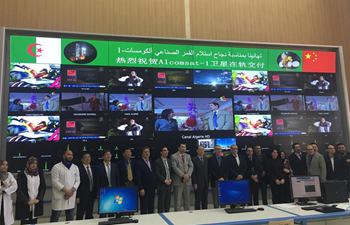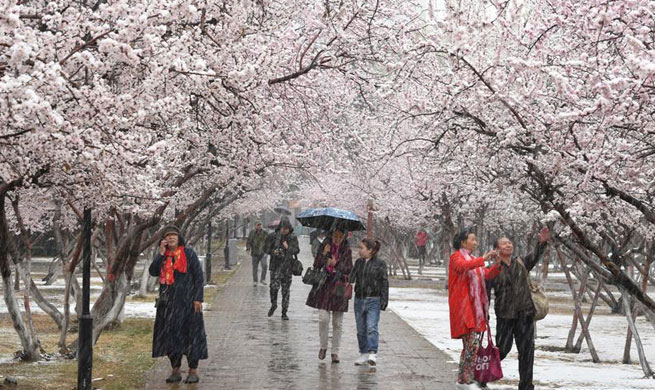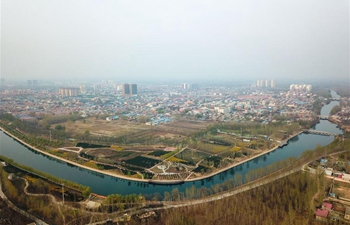SHANGHAI, April 3 (Xinhua) -- An 89-year-old warehouse on the south bank of Suzhou River was recently refurbished as a base for fashion design start-ups, amid Shanghai's efforts to develop its fashion industry.
Yanqingli, an English-style warehouse, built in 1929, which had been deserted for a long time, is now home to many designers, providing guidance and services for entrepreneurs, supply chain collaboration, and integrated marketing.
"All we need to focus on is the design itself, the rest is taken care of," said Feng Guang, founder of designer brand Mukzin.
Ye Yongming, chairman of Bailian Group, said the company plans to reinvent Yanqingli as an international fashion district with an industry scale as much as six billion yuan.
As Shanghai is ambitious to become a fashion hub and stage fashion shows with international influence, the city's fashion weeks are now gaining more and more attention.
With more than 40,000 industry insiders involved this year, Shanghai Fashion Week is approaching the top level of international fashion weeks, according to a report released last week. Data shows that during the 2018 Shanghai Fashion Week, which ran from March 28 to April 3, fashion retail sales in the surrounding area increased by 32 percent.
"I think that there's a good chance for Shanghai to become the 'fifth biggest fashion week,' and the chamber will help Italian fashion resources to strengthen ties with Shanghai Fashion Week," said Carlo Capasa, chairperson of the Italian Chamber of Fashion.
According to Capasa, in order to gain influence on the world stage, Shanghai Fashion Week needs to pay more attention to independent and avant-garde brands.
Shanghai is making progress. Collaborating with stage artists Xiao Ke and Zi Han, independent designer Zhang Na introduced her newest eco-friendly collection "Reclothing Bank" during ongoing Shanghai Fashion Week 2018 Autumn Winter (AW) with a runway full of stage show effects. Ordinary people, rather than models, were invited to tell their stories while presenting the clothes on the runway.
"Donated clothes and old fabric can have a second life with a little help from redesigning," Zhang said, "It is of vital importance that the sentimental value of old artifacts are respected."
As Chinese consumers are beginning to become more interested in indie brands, retail boutiques and wholesale showrooms have increased during the last couple of years. Shanghai is striving to build all parts of the industrial chain in order to support the growth of boutiques and showrooms.
Fang Zhi, founder of Tudoo Showroom, said there are now approximately 3,000 boutiques and 60 showrooms around China, compared to about 50 boutiques and 10 showrooms in 2013.
"Tudoo Showroom has been achieving 100 to 150 percent sales growth over the past four years, thanks to sales made during trade shows in Shanghai," Fang said.
Fashion week not only involves nearly 100 fashion shows and trade shows with over 1,200 brands from more than 30 different countries and regions, but also about helping provide select shops and showrooms with a friendly environment, according to the organizer of Shanghai Fashion Week.

















